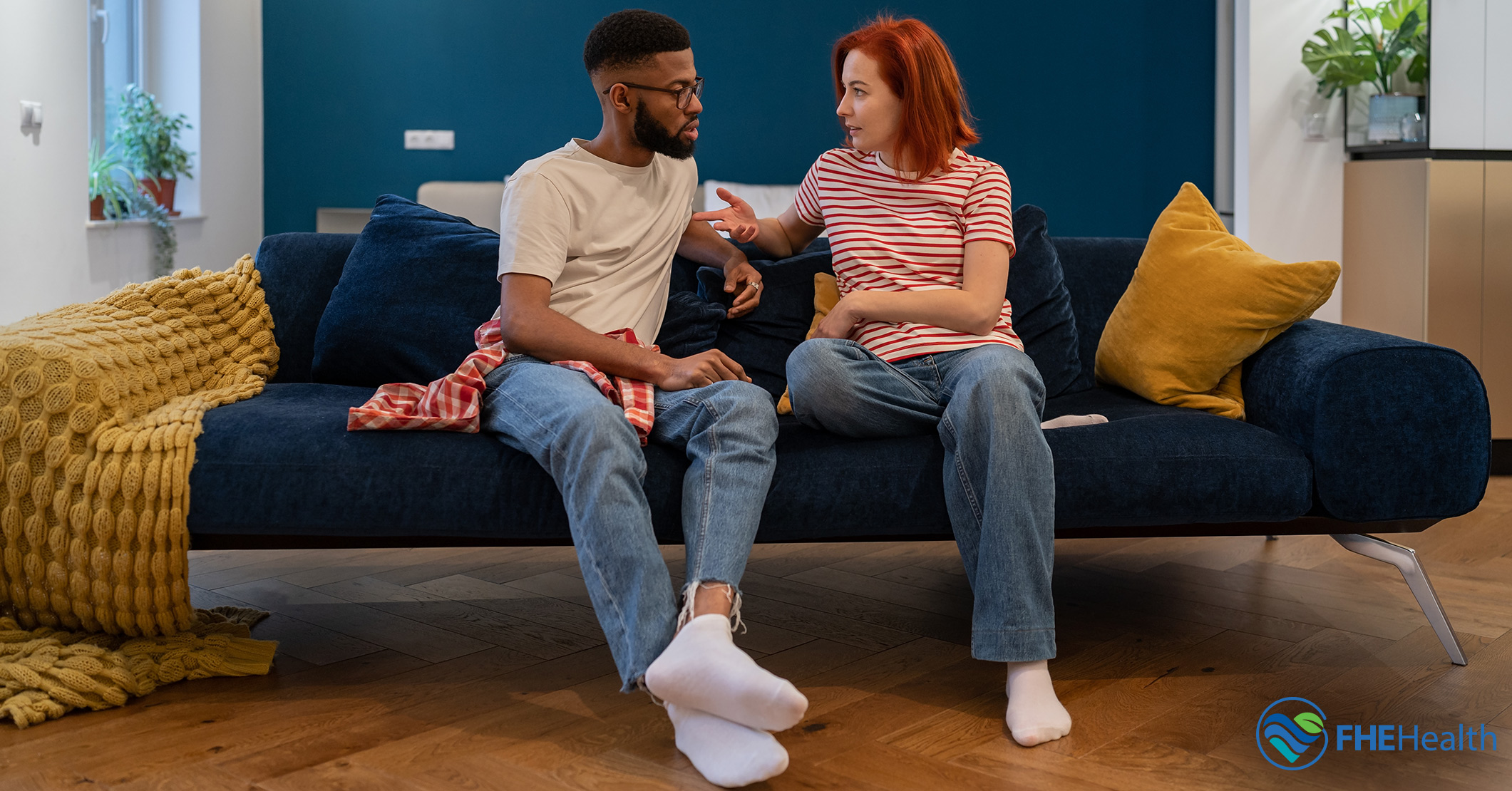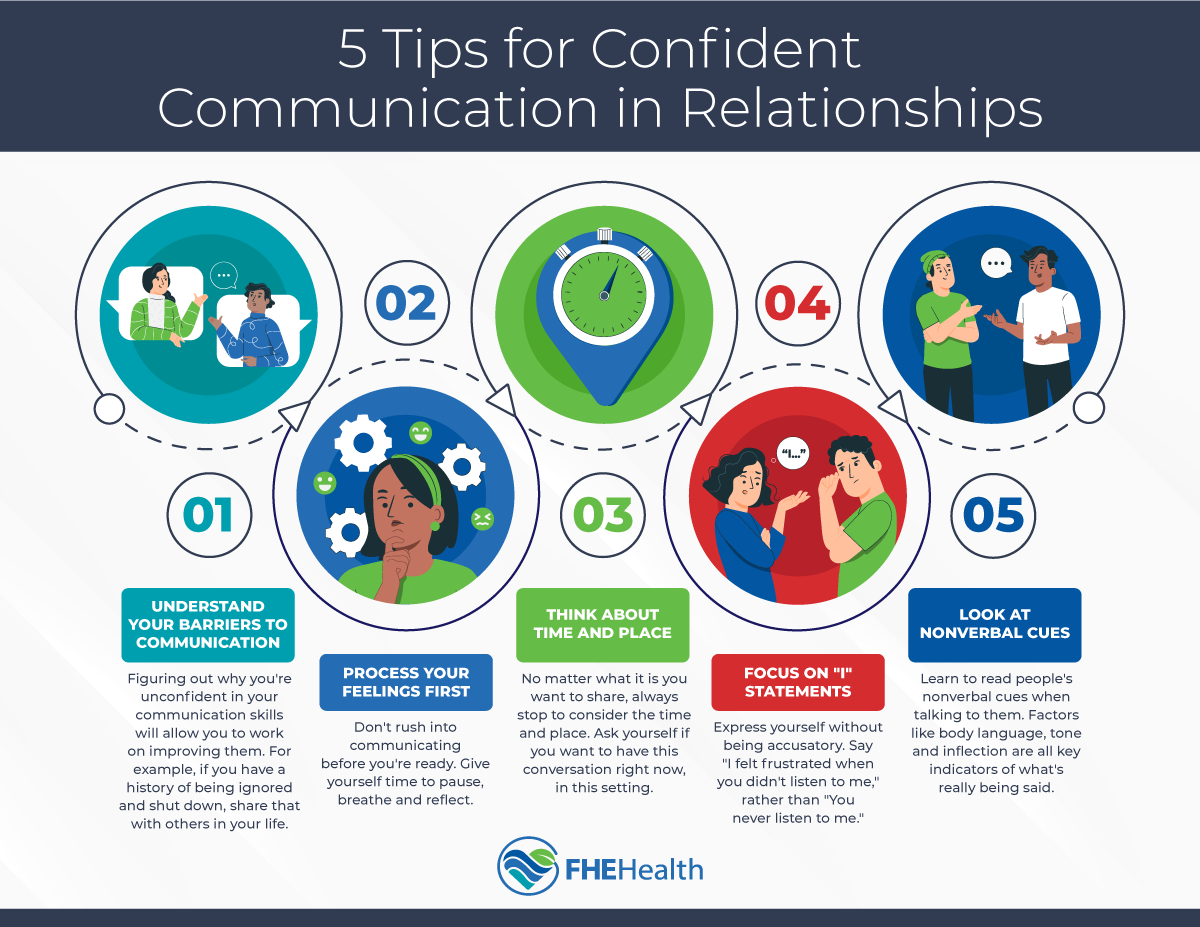
A healthy relationship is one where you can openly share your thoughts, feelings and opinions. Successfully expressing yourself will allow you to work through relationship problems faster and stay aligned on what’s important. But open communication isn’t an easy task. Let’s examine some steps you can take to achieve confident communication in relationships with partners, friends or family members.
5 Tips for Confident Communication in Relationships
Here are five important tips for confident communication in relationships.
1. Understand Your Barriers to Communication
First, it’s essential to understand why you don’t feel you have a strong skill set when it comes to communicating in personal relationships.
Some reasons could be:
- You’ve been in relationships where you were often shut down or ignored when you did try to communicate.
- You have some childhood trauma around communication.
- You suffer from abandonment issues and worry that speaking up will cause someone to leave.
- You are autistic or have another condition that makes it challenging to adequately get your point across, so you no longer even bother.
Figuring out why you’re unconfident in your communication skills will allow you to work on improving them. For example, if you have a history of being ignored and shut down, you can share that history with others in your life. Or if you’re autistic and prefer to communicate in a specific way, you can also share those details with people in your life.
Giving those around you critical details about how you prefer to communicate and why you might express yourself differently can help everybody communicate better.
2. Process Your Feelings First
Oftentimes, people don’t feel confident communicating their emotions because they haven’t given themselves the time to process them. You can’t always effectively share what you’re feeling if you don’t understand it yourself yet.
Don’t rush into communicating before you’re ready. Give yourself time to pause, breathe and reflect. By taking this extra moment, you’ll be able to communicate more clearly and effectively.
3. Think About Time and Place
One of the most effective communication tips you can learn is to consider your surroundings. Sometimes, an eagerness to communicate something overrides our critical thinking abilities. No matter what it is you want to share, always stop to consider the time and place.
Ask yourself if you want to have this conversation right now, in this setting. For example, let’s say you need to tell a friend or loved one they’ve deeply upset you with a comment they’ve just made. If you’re in an intimate gathering with friends, bringing it up in this jolly, social setting might not be very productive.
4. Focus on ‘I’ Statements
When it comes to communicating well in a relationship, you must be able to express yourself without being accusatory. Playing the blame game won’t lead to a constructive conversation. If you’re sharing your thoughts and feelings, focus on “I” statements. State, “I felt frustrated when you didn’t listen to me,” rather than saying, “You never listen to me.” This simple communication method can help keep conversations open and flowing.
5. Look at Nonverbal Cues
Healthy communication skills include taking in much more than what’s being said. It’s estimated that less than 10% of our communication is verbal.
Factors like body language, tone and inflection are all key indicators of what’s really being said.
If you want to communicate well with those in your life, learn to read their nonverbal cues when talking to them. These nonverbal cues can give you a clearer picture of how they’re feeling, which can help you have a more transparent conversation.
Building Confidence in Expressing Thoughts and Feelings
Sometimes, strengthening relationship communication starts with yourself. You can only communicate well in a relationship if you have confidence in your skills. Try taking these actions to build your confidence in expressing your thoughts and feelings:
- Journal daily so you can practice processing and summarizing your feelings.
- Have conversations out loud with yourself when you’re experiencing intense emotions. Talk these feelings out.
- Practice conversations with yourself before you have them.
- Watch, listen and learn how others communicate their feelings to you. Note what you like and try to copy those skills.
- Go to therapy to identify the root of your communication insecurities and work on them.
Creating Healthy Communication Habits in Relationships
Luckily, increasing your confidence in your communication with others is something you can work on. And the people closest to you will likely support you if you share this goal with them.
Here are some habits you can start practicing within your relationships. These simple, easy routines will help with building confidence in your personal relationships:
- Set aside time to connect with the person genuinely. Ensure no person is distracted by phones, televisions or other interruptions.
- Participate in active listening with each other. A conversation is not just you waiting for your turn to speak. Really listen to what the other person is saying. You can show them you’re listening by repeating what they’ve said and asking follow-up questions.
- Avoid interrupting the other person. Whatever you have to say can always wait until they’re done talking.
Communication is hugely important to the health and sustainability of our personal relationships. In romantic relationships, poor communication can be a strong indication of marital dissatisfaction. But the same is true for non-romantic relationships, such as those with friends and family. When you can’t adequately share your thoughts and feelings with those closest to you, it leads to more chances of resentment and misunderstandings.
Aiming to improve your communication skills is a noble undertaking. This critical skill will help you and your loved ones form closer relationships.
Considering Therapy? FHE Health Can Help
Sometimes, the best way to improve is to simply ask for professional help. You can talk to a therapist to understand why you lack confidence communicating in your relationships and learn tools to undo this way of thinking. Let the experienced, compassionate therapists at FHE Health help you get through this. Contact us today to learn more about what we can do for you.







